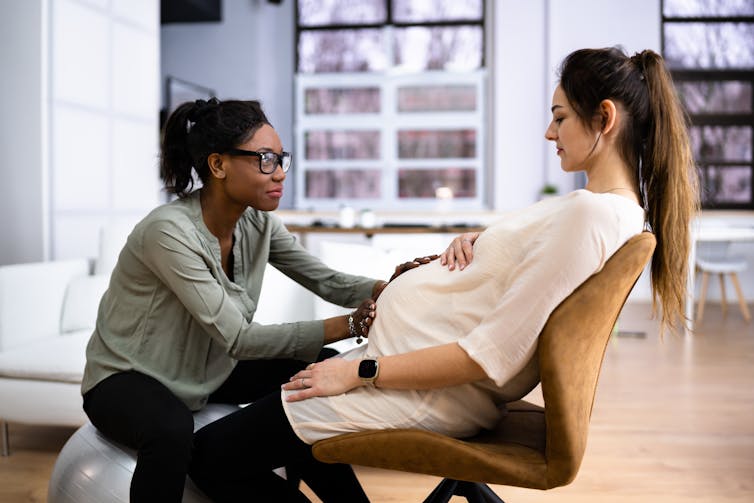
Child Health
4 Ways to Promote Positive Maternal Mental Health

(Family Features) The joys of raising and nurturing a baby are practically endless for new parents, yet there remain challenges to overcome. While it may be natural to focus attention and energy on caring for a new baby, it’s equally important for mothers to maintain their own mental health.
According to Malina Malkani, MS, RDN, CDN, maternal mental health (MMH) is often negatively affected by the belief that there is only one “right” or “best” way to feed a baby. Mothers are exposed to this message through peer-to-peer communication, social media, health care providers and more.
To combat negativity, Malkani promotes the importance of family, friends, online communities and others contributing a positive impact toward MMH by recognizing all babies are different, acknowledging there’s no one “right” way to feed a baby, refraining from parent-shaming and judgement, and remembering caregivers have personal feeding decisions to make based on a variety of factors.
The saying “it takes a village” is as applicable today as ever, which is why Plum Organics and the Policy Center for Maternal Mental Health partnered to share resources and information mothers can use to find support in their communities. Consider these ways moms can nurture their little ones along with their own mental well-being.
Understand the Signs of Mental Health Conditions
Depression and anxiety are the most common complications in pregnancy and postpartum, affecting 1 in 7 women, according to the Policy Center for Maternal Mental Health. If you feel any of these symptoms, seek help from a health care provider: overwhelmed, weepy, anxious or nervous, angry, scared by your thoughts, like you’re not yourself, guilt, regret or shame.
Engage in Self-Care
Spending your time thinking about baby is natural, but it’s important to take care of yourself, too. Watch a movie, socialize with friends, meditate, rediscover hobbies – whatever you enjoy doing, prioritize making it part of your life again.
Join a Supportive Movement
Creating a “village” is a key step toward positive mental well-being for moms as it allows them to build support systems showing they’re not alone in their struggles. To continue efforts to destigmatize mental health challenges for moms and deliver research and support, Plum Organics and the Policy Center for Maternal Mental Health are asking mothers (and their loved ones) to sign a “Pin-tition,” wherein a pin is placed on the U.S. map to indicate where participants want to build a village of support.
The movement encourages participants to put a pin on the map if:
- You think moms suffering from postpartum depression should have access to a professional trained in MMH disorders
- You think moms suffering from MMH disorders should have access to mental health providers within driving distance
- You think moms should be screened for MMH disorders during prenatal and postpartum periods
- You think OBGYNs should discuss mental health at the beginning of pregnancy
- You think mental health care is health care
- You think providers should be reimbursed by insurance for MMH care
Prioritize Physical Health
Taking care of yourself includes physical health as well as mental health. Doing yoga, walking or working out 15-30 minutes a day and nourishing your body with nutrient-rich foods can help restore your sense of balance and provide a boost in self-esteem.
Find more information and drop a pin to shed light on your area by visiting PlumOrganics.com.
Mapping Out Maternal Mental Health
Intended as a resource for policy action, funding drivers and strategic planning, the Maternal Mental Health Risk Factors and Resource Maps developed by Plum Organics and the Policy Center for Maternal Mental Health revealed these findings:
- The highest risk factor levels were concentrated in the Deep South with severe conditions identified in the Mississippi Delta region, Gulf Coast, greater Appalachia, New Mexico and Arizona.
- Higher risk factor levels tend to be associated with rural and less-populated regions. Conversely, most major metropolitan areas in the U.S. tend to have comparatively moderate or lower risk factor scores.
- More than 600,000 mothers will suffer from a MMH disorder in the U.S. every year. Left untreated, these disorders can have devastating impacts on a mother’s health and functioning, the baby’s health and development, and overall family stability.
Photos courtesy of Getty Images
SOURCE:
Plum Organics
Discover more from Daily News
Subscribe to get the latest posts sent to your email.
Child Health
Recognizing the Signs of Pediatric Growth Hormone Deficiency: How Early Recognition and Advocacy Helped One Family Find Answers
Diane Benke noticed her son Alex’s height concerns starting at age 7, despite his pediatrician’s reassurances. After persistent worries, they consulted an endocrinologist, leading to a diagnosis of Pediatric Growth Hormone Deficiency (PGHD). Following treatment changes, including a switch to weekly hormone injections, Alex’s growth improved, allowing the family to focus on their well-being.
Last Updated on February 5, 2026 by Daily News Staff
(Family Features) “Our concerns about Alex’s growth began around the age of 7,” said his mother, Diane Benke.
Though Alex measured around the 50th percentile for weight, his height consistently hovered around the 20th percentile. Benke’s instincts told her something wasn’t quite right.
“I kept asking our pediatrician if this could mean something more,” she said. “Each time, I was reassured that everything was fine. After all, I’m only 5 feet tall myself.”
At first, Benke tried setting her worries aside. Alex was one of the youngest in his class, and she wondered if he could simply be a “late bloomer.”
However, as Alex progressed through elementary school, particularly in the 4th and 6th grades, his height percentile dropped into the single digits. The height difference between Alex and his peers became impossible to ignore.
Despite Benke’s growing concerns, their pediatrician continued to assure them Alex was fine.
“We were told as long as he was making some progress on the growth chart, there was no need to worry,” she said, “but we were never actually shown the charts.”
It wasn’t until one of Benke’s friends confided that her own daughter had recently been diagnosed with Pediatric Growth Hormone Deficiency (PGHD) that she decided to seek an endocrinologist.
“Although it took several months to get an appointment,” Benke said, “we were determined to get more answers.”
Navigating the Diagnosis Process
Getting a diagnosis for many medical conditions can be a long journey. However, early detection and diagnosis of PGHD is important. It can help minimize the impact on overall health and support optimal growth.
Once Alex was seen by a pediatric endocrinologist, he underwent a series of evaluations, including bloodwork, a bone age X-ray to compare his chronological age with his skeletal age and a growth hormone stimulation test, which measures the body’s ability to produce growth hormone. He also had a brain MRI to rule out the potential of any pituitary abnormalities.
The results of these tests confirmed the diagnosis of PGHD, a rare condition that occurs when the pituitary gland does not produce enough growth hormone. PGHD affects an estimated 1 in 4,000-10,000 children.
Some common signs parents might notice include: their child being significantly shorter than other kids their age, slower growth rate over time, delayed puberty, reduced muscle strength or lower energy levels, slower bone development and delayed physical milestones.
“Receiving Alex’s diagnosis was a relief,” Benke said. “It provided clarity and a path forward.”
Moving Forward with Treatment
“While the diagnosis process was exhausting, starting treatment made the process worthwhile,” Benke said.
For decades, daily injections of a drug called somatropin, which is similar to the growth hormone your body produces, have been the standard of care for PGHD. It wasn’t until 2015 that the Growth Hormone Research Society recognized the need for a long-acting growth hormone (LAGH), offering once-weekly dosing as an alternative to daily injections.
Benke explained navigating the insurance approval process was another challenge.
“Our insurance required us to try a daily medication before approving a weekly option,” she said.
Alex spent three months on daily medication, often missing doses, before he was approved to switch to a weekly treatment option.
“The weekly option made such a positive impact,” Benke said. “We now have minimal disruptions to our daily routine and Alex hasn’t missed a single dose since.”
Beyond a more convenient dosing option, the change gave Benke peace of mind.
“We could focus more on being a family again, without the daily worries of his next dose,” she said.
If you’re concerned about your child’s growth, talk to their doctor as soon as possible. Early diagnosis is important, as treatment becomes less effective once a child’s bones stop growing.
Benke’s advice to other parents: “Trust your instincts. If something feels wrong, seek out a specialist and push for answers and don’t give up, even when faced with hurdles… Stay hopeful and persistent – it’s a journey worth fighting for.”
Visit GHDinKids.com to download a doctor discussion guide to help prepare for your next appointment.
SOURCE:
Skytrofa
Discover more from Daily News
Subscribe to get the latest posts sent to your email.
Lifestyle
How to reduce gift-giving stress with your kids – a child psychologist’s tips for making magic and avoiding tears
Reduce gift-giving stress with kids: A child psychologist shares practical rules for stress-free gift giving with kids—how many gifts to give, what holds attention, and how to avoid holiday tears.
Last Updated on January 9, 2026 by Daily News Staff

Dive into “The Knowledge,” where curiosity meets clarity. This playlist, in collaboration with STMDailyNews.com, is designed for viewers who value historical accuracy and insightful learning. Our short videos, ranging from 30 seconds to a minute and a half, make complex subjects easy to grasp in no time. Covering everything from historical events to contemporary processes and entertainment, “The Knowledge” bridges the past with the present. In a world where information is abundant yet often misused, our series aims to guide you through the noise, preserving vital knowledge and truths that shape our lives today. Perfect for curious minds eager to discover the ‘why’ and ‘how’ of everything around us. Subscribe and join in as we explore the facts that matter. https://stmdailynews.com/the-knowledge/
Discover more from Daily News
Subscribe to get the latest posts sent to your email.
health and wellness
Texas cities have some of the highest preterm birth rates in the US, highlighting maternal health crisis nationwide

Texas cities have some of the highest preterm birth rates in the US, highlighting maternal health crisis nationwide
Revealing disparities that drive preterm birth rates
The March of Dimes report scored the U.S. overall a D+ grade on preterm birth rate at 10.4%, but states differ dramatically in their scores. New Hampshire, for example, scored an A- with 7.9% of infants born prematurely, while Mississippi, where 15% of infants are born prematurely, scored an F. Texas’ rates aren’t the worst in the country, but it scores notably worse than the national rate of 10.4%, with 11.1% of babies – 43,344 in total – born prematurely in 2024. And Texas has an especially large effect on the low national score because 10 of the 46 cities that receive a D or F grade – defined in the report as a rate higher than the national rate of 10.4% – are located there. In 2023, Texas had the highest number of such cities in the U.S. That may be in part because access to maternal care in Texas is so limited. Close to half of all counties across the state completely lack access to maternity care providers and birthing facilities, compared with one-third of counties across the U.S. Moreover, more counties in Texas are designated as health professional shortage areas, meaning they lack enough doctors for the number of people living in these areas. Shortages exist in 257 areas in Texas for primary care doctors, 149 for dentists and 251 for mental health providers. But even against the backdrop of geographic differences in health care access, the starkest contribution to the state’s preterm birth rates comes from ethnic and racial disparities. Mothers of non-Hispanic Black (14.7%), American Indian/Alaskan Native (12.5%), Pacific Islander (12.3%) and Hispanic (10.1%) descent have babies prematurely much more often than do mothers who are non-Hispanic white (9.5%) or Asian (9.1%). These numbers reflect the broader landscape of maternal health in the U.S. Although nationwide maternal mortality rates decreased from 22.3 to 18.6 deaths per 100,000 live births from 2022 to 2023, Black women died during pregnancy or within one year after childbirth at almost three times the rate (50.3%) of white (14.5%), Hispanic (12.4%) and Asian (10.7%) women.
Preterm birth in context
Having a baby early is not the normal or expected outcome during pregnancy. It occurs due to complex genetic and environmental factors, which are exacerbated by inadequate prenatal care. According to the World Health Organization, women should have eight or more doctor visits during their pregnancy. Without adequate and quality prenatal care, the chances of reversing the preterm birth trends are slim. Yet in Texas, unequal access to prenatal care remains a huge cause for concern. As the March of Dimes report documents, women of color in Texas receive adequate prenatal care at vastly lower rates than do white women – a fact that holds true in several other states as well. In addition, Texas has the highest uninsured rate in the nation, with 17% of women uninsured for health coverage, compared with a national average of 8%. Nationwide, public health experts, community advocates and families are calling for comprehensive health insurance to help cover the costs of prenatal care, particularly for low-income families that primarily rely on Medicaid for childbirth. Cuts to funding for the Affordable Care Act and Medicaid outlined in the 2025 Budget Reconciliation Act make it likely that more Americans will lose access to care or see their health care costs balloon. But state-level action may help reduce access barriers. In Texas, for example, a set of laws passed in 2025 may help improve access to care before, during and after pregnancy. Texas legislators funded initiatives targeted at workforce development in rural areas – particularly for obstetrician-gynecologists, emergency physicians and nurses, women’s preventive safety net programs, and maternal safety and quality improvement initiatives. Rising rates of chronic diseases, such as hypertension, obesity and diabetes, also contribute to women giving birth prematurely. While working with the state maternal mortality and morbidity review committee, my team and I found that cardiovascular conditions contributed to the 85 pregnancy-related deaths that occurred in 2020. An upward trend in obesity, diabetes and hypertension before pregnancy are pressing issues in the state, posing a serious threat to fetal and maternal health.Learning from other countries
These statistics are grim. But proven strategies to reduce these and other causes of maternal mortality and morbidity are available. In Australia, for instance, maternal deaths have significantly declined from 12.7 per 100,000 live births in the early 1970s to 5.3 per 100,000 between 2021 and 2022. The reduction can be linked to several medical interventions that are based on equitable, safe, woman-centered and evidence-based maternal health services. In Texas, some of my colleagues at Texas A&M University use an equitable, woman-centered approach to develop culturally competent care centered on educational health promotion, preventive health care and community services. Utilizing nurses and nonmedical support roles such as community health workers and doulas, my colleagues’ initiatives complement existing state efforts and close critical gaps in health care access for rural and low-income Texas families. Across the country, researchers are using similar models, including the use of doulas, to address the Black maternal health crisis. Research shows the use of doulas can improve access to care during pregnancy and childbirth, particularly for women of color.
It’s all hands on deck
There isn’t one, single risk factor that leads to a preterm birth, nor is there a universal approach to its prevention. Results from my work with Black mothers who had a preterm birth aligns with what other experts are saying: Addressing the maternal health crisis in the U.S. requires more than policy interventions. It involves the dismantling of system-level and policy-driven inequities that lead to high rates of preterm births and negative pregnancy and childbirth outcomes, particularly for women of color, through funding, research, policy changes and community voices. Although I had my preterm birth in Nigeria, my story and those shared by the Black mothers I have worked with in the U.S. show eerily similar underlying challenges across different settings. Kobi V. Ajayi, Research Assistant Professor of Maternal and Child Health, Texas A&M University This article is republished from The Conversation under a Creative Commons license. Read the original article.Discover more from Daily News
Subscribe to get the latest posts sent to your email.
